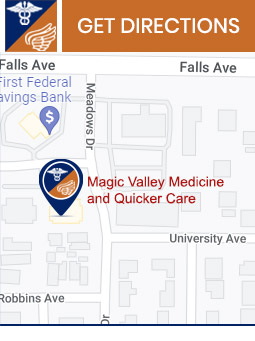Semaglutide GLP-1 Weight Loss: Do You Meet the BMI Requirement?
Semaglutide GLP-1 can be an effective weight loss solution, but eligibility depends on meeting certain BMI requirements. To determine if you qualify for this treatment, you’ll need to calculate your BMI. If you’re considering semaglutide GLP-1, come to us at Magic Valley Medicine and Quicker Care for a comprehensive evaluation and personalized treatment plan. For more information, contact us today or schedule an appointment online. We are conveniently located at 844 North Washington St. Suite 200 Twin Falls, ID 83301.



Additional Services You May Like

Additional Services You May Like
- Walk-In Urgent Care
- Family Medicine
- Chiropractor
- Hormone Replacement
- Abscesses/Skin Infections
- Acute Fracture
- Allergies
- Back Pain Or Strains
- Bladder Infections
- Bronchitis
- Colds
- Cuts/Minor Lacerations
- Stomach Flu (Gastroenteritis)
- Semaglutide GLP-1
- Diarrhea
- Ear Infections
- Ear Wax Removal
- Eye Infections/Styes
- Fingernail/Toenail Injuries
- Hemorrhoids
- Flu
- Insect/Bee Stings
- Laryngitis
- Psychiatric Conditions (Depression/Anxiety)
- Sinus Infections
- Crush Injuries
- Knee Sprain
- Strep/Sore Throat
- Contusions
- Complex Non-Plastic Lacerations
- Eye Foreign Body/abrasions
- Minor Dislocations
- Wrist, Hand Sprains
- Swimmer’s Ear
- Sports Physicals
- Shoulder Sprain
- Ankle Sprain
- COVID Testing
- Tirzepatide
- Mounjaro
- Zepbound
- Pain Management for Chronic Pain






